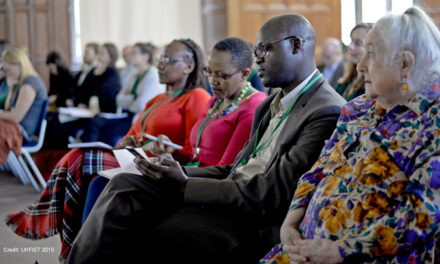This UKFIET Blog is contributed by Mike Douse who accepts that scanning the far horizon sensibly can be a valuable means of keeping immediate challenges in perspective, yet calls upon teachers, learners and planners to be healthily sceptical about all mega-philosophies, and believes that education, as currently evolving, will be the bulwark against which the balderdash of Longtermism will flounder.
‘Longtermism’ is about the very far-off future: 3066 and all that. ‘Effective altruism’, its companion crusade, involves people doing good in the “most clear-sighted, ambitious, and unsentimental way as possible”, to quote William MacAskill, who goes on to argue that, for example, working for a charity is a less effective way of doing good than is becoming a trainee in an investment bank because “in the end, you will have far more loot to distribute”.
On the face of it, this seems to make some sense. Don’t get bogged down in current and foreseeable challenges, look far far ahead into humanity’s distant future (if it is to have one) and, in doing so, rationalise your charitable giving. As MacAskill puts it, “99.5% of all human experience has yet to be lived… if we can dodge catastrophe, there are 80 trillion people yet to come… we are the ancients… they need us to start protecting them” (ibid).
Certainly, to the rich and the powerful, it is an attractive ideology. Foundations such as the Future of Humanity Institute, Open Philanthropy, the FTX Future Fund, the Global Priorities Institute, the Forethought Foundation, and the Machine Intelligence Research Institute all so far flourish. Influential Washington lobbyists aim to place longtermists in high-level US government positions to shape long-term policy. Young tech billionaires (such as Elon Musk, the libertarian and Trump supporter Peter Thiel, and Sam Bankman-Fried before he went bankrupt) have rallied to the cause. All of which, let us face it, should cause us to be cautious.
For longtermism, as proposed by its adherents, is nothing to do with caring about the long term or of valuing the wellbeing of future generations but, rather, a matter of “fulfilling our potential as a species of Earth-originating intelligent life”. Moreover, “the worst natural disasters and devastating atrocities in history become almost imperceptible trivialities when seen from this grand perspective… the two world wars, AIDS and the Chernobyl nuclear accident… are mere ripples on the surface of the great sea of life”.
As well-informed critic Émile Torres summarises the situation, it is all about “using advanced technologies to reengineer our bodies and brains to create a superior race of radically enhanced posthumans and travelling to a nearby star and establishing enough of a foothold to create a new flourishing society from which we could venture further”. By this distorted logic, climate change, biodiversity loss, thermonuclear exchanges or accidents, and natural or synthetic pandemics are of limited significance, provided they do not result in total human extinction: a long term in which no people are present. Which is a thesis so absurd, so dangerous, so inhuman that it could only have been thought up by highly intelligent people.
Longtermism tells us to maximise economic productivity, our control over nature, our presence in the Universe, the number of (simulated) people who exist in the future, the total amount of impersonal ‘value’, and so on. But to maximise, we must develop increasingly powerful – and dangerous – technologies; failing to do this would itself be an existential catastrophe. As Carl Sagan put it: “we have become powerful without becoming commensurately wise”. And that we must and may rectify.
Not for nothing do these flawed fanatics ignore the role of education in their longtermist fantasies. Over recent decades I have been privileged to address UKFIET and other audiences on education’s forthcoming fundamental transformation: schools becoming processes rather than places, the shattering of the linkage between education and employment, the open global school and the tangible/virtual duality of contemporary consciousness. Tomorrow’s self-directed learners, encouraged and supported (rather than led) by well-informed teachers, will readily reject the ideology of longtermism in favour of the flourishing of humanity.
As my colleague Philip Uys expresses it, “across the millennia, education has been misapplied in the service of particular magical, religious, military, ideological, empire-governing, social justice, ecological, and economic development objectives”. While learners and teachers should be healthily sceptical regarding any and all mega-philosophies, scanning the far horizon sensibly can be a valuable means of keeping our immediate challenges in perspective. Whether humanity – in both of its senses – has a future is the question. Education – eagerly-enlightened, learner-led and propaganda-free – is the answer.





